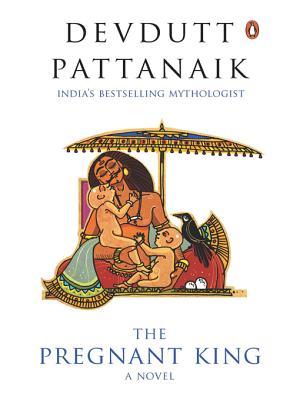 |
| Source: Goodreads |
Devdutt Pattanaik
2008, Penguin India
349 pages, myth, social critique, speculative
Found: Starmark, Mani Square Mall, Kolkata
The Mahabharata is full of gender-bending stories, including that of King Yuvanashva, who accidentally drinks a magic potion and gives birth to a son.
Yuvanashva's mother is a powerful woman who would have made a wonderful king, if she had been born a male. As it is, the young widow takes control of the kingdom as her son is growing up, leading to an era of peace and prosperity.
Shikhandi, born a princess, was raised as a son and taught the secrets of warcraft. She finally exchanges her sex for that of a male.
Two boys pretend to be husband and wife to trick the queens into giving them a gift. After they are arrested, the one disguised as a woman is given the opportunity to become a woman for real. The two "boys" then declare their love for each other and their desire to marry.
Arjuna, the best warrior of the Pandava brothers, conceals himself as an eunuch during their year of exile. He spends his time teaching princesses how to dance.
Through these and other stories taken from the epic, Pattanaik explores the tangled meanings of gender, sex, and love in ancient (and modern) India. The novel is an interesting and quick read, but you should probably have some background knowledge of the Mahabharata before you begin.
What does gender (or sex) mean?
All of these tales are united by their questioning of the generally accepted understanding of the connection between gender and sex. Neither of these concepts are binary.
In two of these tales, Shikhandi and the two boys, the characters undergo a physical change to obtain genitalia other than that they were born with. In Shikhandi's case, this physical change acts as a confirmation of the gender he was raised as. His younger sister, Draupadi, has always considered him to be male. What, then, did the physical change accomplish?
When the boy disguised as a woman is offered the chance to choose whether or not to become a woman, he is hesitant at first. Then he realizes that he loves his friend, and has always loved his friend. What he wants is to marry his friend, have children, and be a housewife. It seems that this character was always homosexual (without realizing it), and that her conversion into a woman will allow her to live with the one she loves. At least, this is my understanding of the story according to Pattanaik's retelling.
I am very conflicted about the meaning of these two stories. They emphasize the importance of physical genitalia in determining (or confirming) one's gender identity, which is not always the case. The second tale also indicates that homosexual people want to be the other gender, which again is not always the case. In the end, these stories question the standard narratives, but then try to place the characters back into their "correct" box at the end. Is this helpful because it questions the main narrative, or unhelpful since it reinforces the main narrative in the end?
On motherhood
The aspect of this gender-bending that most bewilders the main character, Yuvanashva, is the fact that he is both a father (having created life outside of his body) and a mother (having created life inside of his body). When he wants to be called "mother" by his son, his wives and his son himself are resistant to the idea. Does it make him a freak of nature that he has become a mother? Perhaps, but should he be penalized for that? No!
In the end, Yuvanashva cannot reconcile his two roles as a mother and as a father. He ends up relinquishing the throne because of these doubts.
Again, I am conflicted about the way motherhood and fatherhood are portrayed in this book. The definitions given in the novel (i.e. where one has created life) are purely biologically based. Not everyone becomes a mother or a father in this way. What about adopted children? What about transmen who decide to become pregnant?
All in all, I appreciate the way Pattanaik uses stories from the Mahabharata to explore the question of gender and sexual identity. I just wish this exploration were expanded to include non-binary understandings of sex and gender.
The Pregnant King is available from Amazon, Flipkart, and in bookstores across India.
Interesting review with some valid questions. Some of the contradictions probably reflect the contradictions between spiritual views of sexuality/gender and cultural practice. I heard this author on a panel on sexuality/gender diversity from the Jaipur Festival and was intrigued by his work. As a member of the LGBTQ community myself I do want to read this book. Is there a background source you would recommend?
ReplyDeleteHmm, in terms of background on the Mahabharata? It's a huge wonderful mess of an epic, told in around 100,000 lines of text. If you want to read/ skim the whole thing, here's the only translation that's available in full: http://www.gutenberg.org/ebooks/15474
DeleteThis penguin edition translated by John D. Smith seems to be a good summary of the plot (with bits that are also direct translations). I would recommend reading this one first. http://www.amazon.in/The-Mahabharata-Penguin-Classics-Anonymus/dp/0140446818
And then The Pregnant King is just one of many adaptations/ novelizations of the epic. Another one that is good and deals with gender is Chitra Banerjee Divakaruni's The Palace of Illusions. https://www.goodreads.com/book/show/1774836.The_Palace_of_Illusions?from_search=true
It's an ongoing task, but hopefully this will help you get started on the epic.